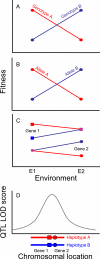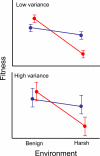Origin, fate, and architecture of ecologically relevant genetic variation
- PMID: 22341792
- PMCID: PMC3413448
- DOI: 10.1016/j.pbi.2012.01.016
Origin, fate, and architecture of ecologically relevant genetic variation
Abstract
Recent advances in molecular genetics combined with field manipulations are yielding new insight into the origin, evolutionary fate, and genetic architecture of phenotypic variation in natural plant populations, with two surprising implications for the evolution of plant genomes. First, genetic loci exhibiting antagonistic pleiotropy across natural environments appear rare relative to loci that are adaptive in one or more environments and neutral elsewhere. These 'conditionally neutral' alleles should sweep to fixation when they arise, yet genome comparisons find little evidence for such selective sweeps. Second, genes under biotic selection tend to be of larger effect than genes under abiotic selection. Recent theory suggests this may be a consequence of high gene flow among populations under selection for local adaptation.
Copyright © 2012 Elsevier Ltd. All rights reserved.
Figures



References
-
- Ceccarelli S, Grando S, Maatougui M, Michael M, Slash M, Haghparast R, Rahmanian M, Taheri A, Al-Yassin A, Benbelkacem A, et al. Plant breeding and climate changes. Journal of Agricultural Science. 2010;148:627–637.
-
- Sexton JP, McIntyre PJ, Angert AL, Rice KJ. Annual Reviews, editor. Evolution and Ecology of Species Range Limits. Annual Review of Ecology Evolution and Systematics. 2009. pp. 415–436. Annual Review of Ecology Evolution and Systematics.
-
- Heller NE, Zavaleta ES. Biodiversity management in the face of climate change: A review of 22 years of recommendations. Biological Conservation. 2009;142:14–32.
Publication types
MeSH terms
Grants and funding
LinkOut - more resources
Full Text Sources

